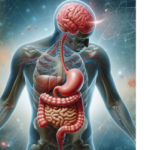When you ask people about their ultimate desires, the most common response tends to be a yearning for happiness or experiences that bring joy. In our rapidly moving society, it’s all too easy to become entangled in the pursuit of instant gratification. The delightful rush of dopamine released in our brains while savoring a decadent slice of cake is undeniably satisfying. This momentary pleasure arises as a natural response, a swift burst of joy signaled by the brain's reward system. Dopamine serves as a driving force, nudging us toward behaviors that promise immediate satisfaction. However, this pleasure is often fleeting, leaving us feeling an insatiable desire for more once the initial high dissipates.
Although indulging in a sweet treat can elevate our mood temporarily, it’s crucial to understand that these experiences are not long-lasting. They provide a brief escape from the pressures of daily life. While these sugary pleasures can be enjoyable in the moment, they rarely contribute significantly to our overall happiness or long-term satisfaction. The ephemeral nature of these pleasures can create a repetitive cycle of craving more, resulting in a constant search for fulfillment that ultimately feels unachievable.
 Consider a scenario where you reward yourself with a slice of cake or a handful of biscuits after a challenging day at work. The surge of sugar and the release of dopamine provide a moment of relief and joy. Yet, as the initial thrill subsides, the stress that prompted the indulgence remains unaddressed. This often leads to reaching for another slice, a few more biscuits, or perhaps another sugary indulgence like ice cream or chocolate, perpetuating the cycle of temporary relief.
Consider a scenario where you reward yourself with a slice of cake or a handful of biscuits after a challenging day at work. The surge of sugar and the release of dopamine provide a moment of relief and joy. Yet, as the initial thrill subsides, the stress that prompted the indulgence remains unaddressed. This often leads to reaching for another slice, a few more biscuits, or perhaps another sugary indulgence like ice cream or chocolate, perpetuating the cycle of temporary relief.
As this behavior becomes a pattern, you may find yourself increasingly dependent on sugary treats to cope with stress and emotional turmoil. Over time, this dependency can foster a cycle of overconsumption, where individuals continuously seek the next sugar rush as a means to escape feelings of anxiety or sadness. Despite the temporary pleasure derived from each indulgence, true satisfaction often eludes you, leaving behind a lingering sense of discontent.
This cycle of pursuing fleeting pleasures can result in various negative consequences. Physically, it may lead to weight gain, energy crashes, and, over time, serious health concerns such as diabetes or heart disease. Emotionally, it can evoke feelings of guilt, shame, and increased stress, especially when you become aware of unhealthy habits but feel powerless to change them. The more you indulge in these transient pleasures, the more trapped you may feel in a cycle of discontent, struggling to attain lasting satisfaction or true happiness.
Conversely, true happiness represents a deeper, more enduring state of being. It transcends mere momentary enjoyment; it embodies a lasting sense of contentment and purpose. True happiness stems from engaging in meaningful activities, nurturing relationships, and contributing to causes greater than ourselves. It is an accumulation of experiences that foster a sense of achievement, profound connections, and inner tranquility, cultivated over time.

Family is everything
The connections we form with others are among the most profound sources of our happiness. Spending quality time with family and friends, sharing experiences, and creating lasting memories foster a sense of belonging and emotional support. These meaningful relationships enrich our lives far beyond the temporary joy offered by sugary indulgences. By prioritizing the cultivation and maintenance of these connections, we lay the groundwork for lasting happiness and fulfillment.
Thus, while the enjoyment derived from a sweet treat can brighten your day, the lasting joy found in meaningful relationships and enriching experiences adds true depth to our lives. By focusing on these more substantial sources of happiness, we can cultivate a richer, more satisfying existence that surpasses the temporary highs of fleeting pleasures.
Understanding the Neuroscience Behind Pleasure and Happiness
Engaging in activities such as enjoying a delicious dessert activates the brain's reward pathways, leading to the release of dopamine, a neurotransmitter integral to our experience of pleasure and motivation. Dopamine plays a crucial role in the brain’s reward circuitry, which includes vital regions such as the nucleus accumbens and the ventral tegmental area, both essential for processing rewards and reinforcing behaviors that are beneficial for our survival.
When we savor something sweet, like cake, our sensory experience—the taste, aroma, and texture—initiates a complex neural response. This sensory input triggers dopamine release, which generates feelings of pleasure and satisfaction. This biochemical reaction signals to the brain that we have encountered something enjoyable, prompting us to repeat this behavior. This evolutionary mechanism encourages actions critical for survival, such as eating, by associating them with pleasurable sensations.

However, the pleasure derived from these experiences is often ephemeral. The initial dopamine surge produces a fleeting sense of euphoria, but this sensation quickly fades as dopamine levels decrease. The sweetness of the cake and the joy it elicits diminish rapidly, which can lead us to seek repeated experiences that will replicate that initial dopamine spike. This is why we might find ourselves reaching for another slice of cake or pursuing other forms of immediate gratification, hoping to recapture that fleeting pleasure.
Unfortunately, this transient nature of dopamine-driven pleasure can create a dangerous cycle of craving and overindulgence as we chase the next brief high, seeking to recreate the initial pleasurable sensation. This pattern can ultimately be detrimental to our overall health and well-being.
It’s essential to recognize that while dopamine-induced pleasures are integral to our brain’s functioning, they are not intended to deliver lasting fulfillment. These moments of intense pleasure are ephemeral and do not significantly contribute to our long-term happiness. Instead, they provide a quick diversion, a temporary respite from life’s challenges and stressors.
By understanding the neuroscience behind pleasure, we can better appreciate why certain activities tempt us and why they often leave us wanting more. This understanding also highlights the necessity of pursuing more sustainable sources of happiness that can yield a deeper sense of satisfaction and well-being over time.
Exploring the True Nature of Happiness
Happiness represents a more stable and enduring state of well-being, encompassing a broader and deeper spectrum of experiences that contrasts sharply with the fleeting pleasure induced by dopamine. A fulfilling sense of contentment characterizes happiness, distinguishing it from mere momentary emotions. This enduring happiness, often referred to as eudaimonic well-being, is cultivated through various sources that enrich our lives and contribute to a sense of meaning.
Identifying Key Sources of Lasting Happiness
Embracing Personal Growth for Happiness
A significant pathway to enduring happiness is through personal growth and development. Engaging in activities that challenge us intellectually, emotionally, or spiritually leads to a lasting sense of achievement and fulfillment. Whether it's acquiring a new skill, pursuing a passion, or setting and accomplishing personal goals, the journey of growth and self-improvement fosters a profound understanding of what it means to be truly fulfilled. This commitment to self-betterment not only enhances our intelligence but also nurtures our emotional well-being.
Building Fulfilling Relationships
Another essential component of lasting happiness lies in the quality of our interpersonal relationships. Feeling emotionally secure and having a sense of belonging stem from nurturing solid and supportive connections with partners, friends, and family members. These relationships provide companionship, love, and encouragement, which are fundamental to our overall well-being. Sharing our lives with others, fostering mutual trust and respect, and cultivating a reliable support network are vital elements that contribute to our happiness and fulfillment.

Altruism boosts happiness
Engaging in Meaningful Experiences
Participating in activities that resonate with our values and provide a sense of purpose is also crucial for achieving lasting happiness. This can encompass fulfilling work, hobbies that ignite our passions, or volunteer opportunities that allow us to positively impact the lives of others. These meaningful experiences not only create a sense of purpose but also contribute to a narrative of a life well-lived, enriching both our own lives and those around us.
Navigating the Complex Emotions of Happiness
Happiness encompasses a complex interplay of emotions and psychological well-being. It includes positive feelings such as joy, contentment, and love, as well as the ability to cope with and recover from negative emotions like sadness, anger, and stress. Developing strong emotional resilience is crucial for experiencing enduring joy and happiness, as it enables us to navigate life's challenges with a sense of balance and perspective. This resilience allows us to appreciate the highs and lows of life while maintaining an overall sense of well-being.
In contrast to the quick burst of pleasure from dopamine, which is intense yet fleeting, happiness is built on the cumulative impact of various positive experiences over time. It's less about the intensity of a singular moment and more about the overall quality of our lives. Achieving happiness involves cultivating strong relationships, accumulating a series of accomplishments, and engaging in experiences that contribute to a fulfilling and meaningful existence. This holistic approach to happiness grants a deeper sense of purpose and significance to our lives.
In conclusion, while the pleasure derived from a sweet treat may provide momentary delight, the happiness cultivated through personal growth, nurturing relationships, and engaging in meaningful experiences is far more rewarding. By prioritizing these deeper sources of happiness, we can build a life that is not only enjoyable in fleeting moments but also rich in contentment and joy.
The Article: Happiness vs Pleasure: Savouring the Moments That Matter Appeared First On Jane Stevens Nutrition.


You’ve touched on such an important aspect of modern life. It’s so easy to fall into the cycle of quick pleasures, whether it’s with food, social media, or even shopping. I’ve found that while the initial joy from those experiences can be exhilarating, it often leaves me feeling empty afterward. I’ve started to explore activities that bring sustained happiness, like spending time in nature or practicing mindfulness. They don’t offer that instant dopamine hit, but the joy they bring lingers much longer. It’s fascinating how we can sometimes overlook these more profound sources of happiness in our pursuit of quick fixes. I wonder how we can encourage each other to seek out those deeper experiences rather than getting caught in the superficial whirlpool. What are some ways you’ve found that help shift the focus from instant gratification to lasting joy?
You’ve really captured the paradox many of us face in this fast-paced world. That cycle of quick pleasures can feel so enticing, can’t it? The immediate gratification from a bite of chocolate or a “like” on social media is hard to resist, but as you pointed out, it often leaves us feeling a bit hollow afterward. It’s great to hear that you’ve started exploring activities that cultivate deeper joy, like spending time in nature and practicing mindfulness. Those experiences can be transformative in a way that quick fixes simply aren’t capable of delivering.
Your reflections on the fleeting nature of instant gratification really resonate with me. I’ve often found myself caught in the same cycle, chasing those quick bursts of happiness, whether it’s through treats we indulge in or momentary distractions like scrolling through social media. It’s interesting how we often mistake these brief moments of pleasure for true fulfillment, when in reality, they might be more like quick fixes that leave us craving something deeper.
I completely relate to what you’re saying about the cycle of instant gratification. It’s interesting how easily we slip into that pattern of treating those quick bursts of happiness as if they’re truly satisfying. I’ve found myself doing the same, whether it’s reaching for a sugary snack during a mid-afternoon slump or losing track of time scrolling through social media feeds. In those moments, it feels fulfilling, but then afterward, there’s often a sense of emptiness or a craving for something more substantial.
You hit the nail on the head about that cycle of instant gratification—it’s almost like we’re hard-wired to seek out those quick fixes. Those little moments of pleasure from snacks or endless scrolling can provide such a fast hit, but they always leave us wanting more. I think it’s fascinating how those quick bursts can blur the line between true satisfaction and just passing time. It gets even more complicated when we toss in the pressure of life; sometimes those quick pleasures feel like the only way to cope with everything that’s going on.
“I totally understand where you’re coming from! If you’re looking for ways to break that cycle and find more lasting fulfillment, check out this resource that offers some practical tips and insights.”
https://mannland5.com/quillbot
It’s refreshing to hear your thoughts on the fleeting nature of instant gratification. This struggle is shared by many of us, and it really highlights how our modern lifestyles often push us toward these quick bursts of happiness. It’s so easy to get caught up in the routine of indulging in little treats or losing ourselves in endless social media scrolls. I think what makes this phenomenon even more interesting is how these quick fixes can sometimes dull our senses to deeper, more meaningful forms of fulfillment.
“I’m glad my reflections struck a chord with you! If you’re interested in exploring deeper ways to find fulfillment beyond quick fixes, I invite you to check this out.”
https://mannland5.com/quillbot
It’s great to hear your thoughts on this issue. The cycle of chasing quick bursts of happiness can feel so familiar, can’t it? Those momentary distractions, while enticing, often leave us feeling a sense of emptiness afterward. They provide a release but rarely satisfy deeper needs or long-term desires.
“I’m glad my thoughts resonated with you! If you’re interested in exploring this concept further, check out this insightful resource that dives deeper into finding lasting fulfillment.”
https://mannland5.com/webilaro
It’s refreshing to hear your perspective. The cycle of seeking quick bursts of happiness can often feel like a treadmill, can’t it? Those fleeting moments can be such a distraction from the more meaningful layers of life. They can take us away from our deeper needs, leaving us feeling a bit hollow when the buzz fades.
You’ve touched on such an important aspect of our modern lives—this chase for fleeting pleasures often leaves us feeling empty shortly after. I’ve found that it’s easy to get caught up in the cycle of seeking that instant hit of joy, whether it’s through food, social media, or other quick fixes. Yet, over time, I’ve realized that the experiences that bring me lasting happiness are often less about indulgence and more about connection.